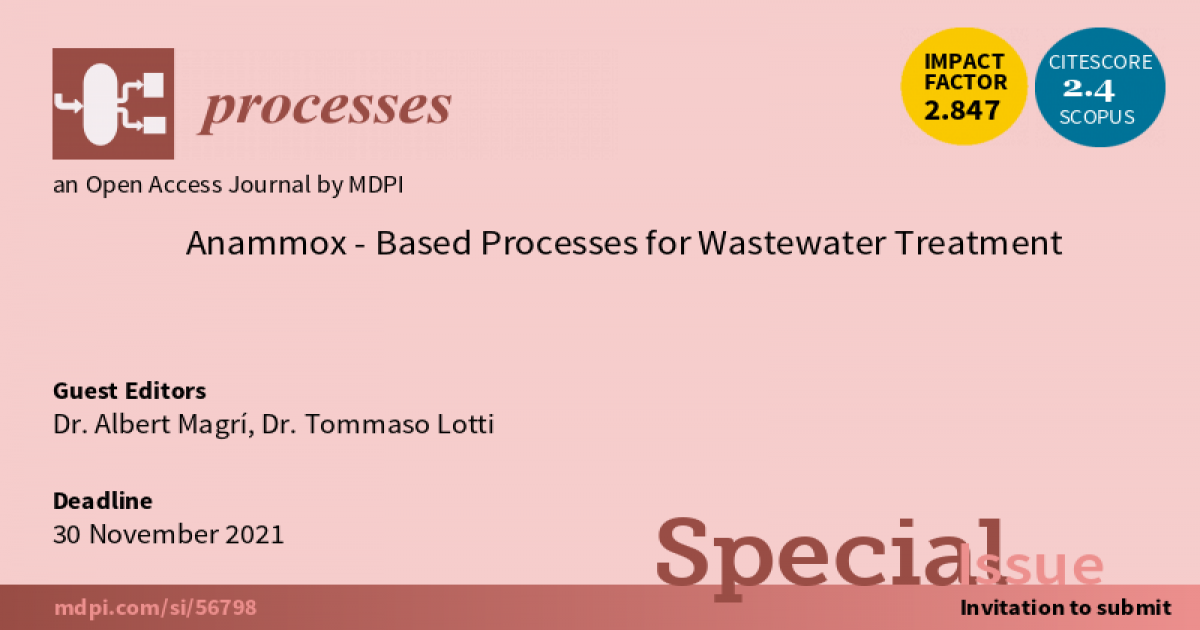Anammox-Based Processes for Wastewater Treatment
A special issue of Processes (ISSN 2227-9717). This special issue belongs to the section "Environmental and Green Processes".
Deadline for manuscript submissions: closed (15 July 2022) | Viewed by 37685

Special Issue Editors
Interests: nutrients; environment; wastewater treatment; environmental biotechnologies; sustainability; resource recovery; phosphate crystallization processes; potassium
Special Issues, Collections and Topics in MDPI journals
Interests: wastewater treatment; resource recovery and valorization; innovative nutrients removal and recovery processes; biofilm; aerobic granular sludge; anammox-based processes; extracellular polymeric substances; EPS; microbial ecology; microbial community engineering
Special Issue Information
Dear Colleagues,
Anaerobic ammonium oxidation (anammox) has become an appealing process for the water sector as a method to remove nitrogen from wastewater using low inputs of energy while maximizing potential for organic carbon valorization. A long road has been travelled since its discovery at the beginning of the nineties. Nowadays, the anammox-based processes can be considered as a feasible alternative for the treatment of sidestreams after sludge digestion in wastewater treatment plants, as well as for some other high-strength industrial wastewaters. Treatment of the mainstream, as well as of other complex wastewaters, is moving forward although it still requires further development to be implemented safely. In addition to the technological and engineering approach, other fundamental issues related to process biochemistry and microbial interactions existing within bioreactors still need to be better understood. The quantification of objective environmental indicators will help in assessing and guaranteeing the sustainability of the anammox-based processes.
This Special Issue will focus on anammox-based processes for wastewater treatment. We welcome novel research, review, and opinion pieces covering all related topics, including:
- Development of new anammox-based solutions and application to wastewater treatment
- Integrated process design, scale-up and full-scale case studies
- Process modelling, simulation, optimization and control
- Process biochemistry, molecular biology and use of omic techniques
- Gaseous emissions
- Sustainability and life cycle assessment
Dr. Albert Magrí
Dr. Tommaso Lotti
Guest Editors
Manuscript Submission Information
Manuscripts should be submitted online at www.mdpi.com by registering and logging in to this website. Once you are registered, click here to go to the submission form. Manuscripts can be submitted until the deadline. All submissions that pass pre-check are peer-reviewed. Accepted papers will be published continuously in the journal (as soon as accepted) and will be listed together on the special issue website. Research articles, review articles as well as short communications are invited. For planned papers, a title and short abstract (about 100 words) can be sent to the Editorial Office for announcement on this website.
Submitted manuscripts should not have been published previously, nor be under consideration for publication elsewhere (except conference proceedings papers). All manuscripts are thoroughly refereed through a single-blind peer-review process. A guide for authors and other relevant information for submission of manuscripts is available on the Instructions for Authors page. Processes is an international peer-reviewed open access monthly journal published by MDPI.
Please visit the Instructions for Authors page before submitting a manuscript. The Article Processing Charge (APC) for publication in this open access journal is 2400 CHF (Swiss Francs). Submitted papers should be well formatted and use good English. Authors may use MDPI's English editing service prior to publication or during author revisions.
Keywords
- anammox-based processes
- deammonification
- microbial interactions
- microbial community analysis
- nitrogen emissions
- biochemical studies
- process modelling and control
- extracellular polymeric substances
- sustainability
Benefits of Publishing in a Special Issue
- Ease of navigation: Grouping papers by topic helps scholars navigate broad scope journals more efficiently.
- Greater discoverability: Special Issues support the reach and impact of scientific research. Articles in Special Issues are more discoverable and cited more frequently.
- Expansion of research network: Special Issues facilitate connections among authors, fostering scientific collaborations.
- External promotion: Articles in Special Issues are often promoted through the journal's social media, increasing their visibility.
- e-Book format: Special Issues with more than 10 articles can be published as dedicated e-books, ensuring wide and rapid dissemination.
Further information on MDPI's Special Issue polices can be found here.






